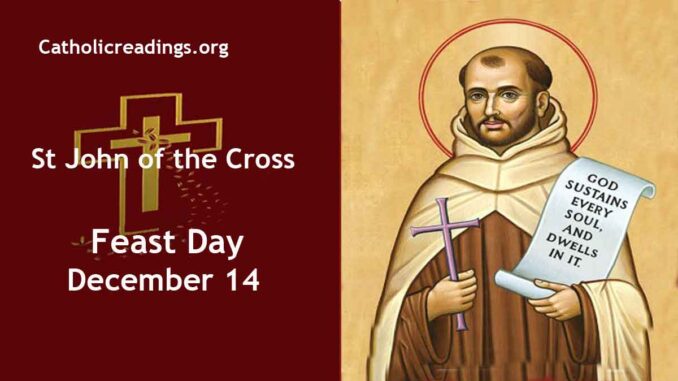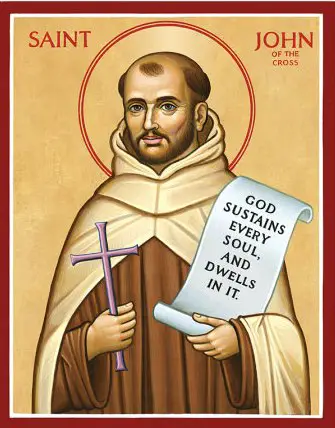St John of the Cross was also known as Juan de Yepes y Álvarez.
He was a Catholic priest, mystic, and a Carmelite friar.
He was born on June 24 1542 in Fontiveros, Spain and died on December 14, 1591 in Ubeda, Spain.
We celebrate his feast day on December 14 every year in the Catholic Church.
| St John of the Cross Biography | |
|---|---|
 |
|
| Date of Birth | June 24 1542 |
| Place of Birth | Fontiveros, Spain |
| Profession | Catholic priest, mystic, and a Carmelite friar |
| Place of Work | Spain |
| Date of Death | December 14 1591 (aged 49) |
| Place of Death | Ubeda, Jaen, Spain |
| Feast Day | December 14 |
| Beatification | By Pope Clement X on January 25 1675 |
| Canonization | By Pope Benedict XIII on December 27 1726 |
| Patron Saint of |
|
St John of the Cross Life History
Saint John of the Cross was born into poverty, with his father being cast away for marrying a poor orphan.
His early life was marked by tragedy, as his father died when he was three, and his brother died two years later due to malnutrition.
Raised in poverty, John experienced early hardships, and his mother, who found work weaving, struggled to support the family.
Sent to a boarding school for poor and orphaned children, John received a religious education from a young age, eventually deciding to follow a religious path.
He served as an acolyte at an Augustinian monastery and, as he grew older, worked in a hospital while attending a Jesuit school.
Despite facing challenges in learning a trade, John became a servant to the poor in a hospital in Medina while continuing his sacred studies.
At the age of 21, he offered himself as a lay-brother to the Carmelite friars, joining the Carmelite Order and taking the name “John of St. Matthias.”
After making vows, he studied theology and philosophy at the university in Salamanca, becoming proficient in the Bible and translating the Song of Songs into Spanish.
Although contemplating a move to the Carthusian Order, he was persuaded by St Teresa of Ávila to stay and assist in the reform of the Carmelite Order.
Attracted by the strict routine followed by Teresa, he became the first Prior of the Barefooted Carmelites.
Facing opposition from elder friars for his reform efforts, John was condemned and cast into prison, enduring nine months of suffering before escaping.
He then joined St Teresa in Avila as her confessor and spiritual guide. During this time, he had a vision of Christ, creating a drawing titled “Christ from Above.”
Amid a rift within the Carmelite order, John worked with Teresa to restore the original, strict routine of the order.
However, political and ecclesiastical conflicts led to violence and disputes between the Discalced Carmelites and the ordinary Carmelites.
Ordered to leave the monastery in Avila, John chose to stay based on the approval of the Papal Nuncio. In 1577, he was forcibly taken to Toledo, tried for disobedience, and imprisoned in harsh conditions. Despite the adversity, he wrote poems and became known as an influential poet.
After nine months, John managed to escape and joined Teresa’s nuns in Toledo. He continued to establish new houses and support the Discalced Carmelites in Andalusia.
The split between the Discalced Carmelites and the rest of the order was formally authorized in 1580, ending the rift.
During the last years of his life, John travelled and established new houses across Spain. He fell ill in 1591 with a skin condition that led to an infection, and he died on December 14, 1591.
His burial sparked a dispute, resulting in the removal of his limbs, which were distributed across several places.
Saint John of the Cross was beatified by Pope Clement X in 1675 and canonized by Pope Benedict XIII in 1726.
He is the patron of contemplatives, mystics, and Spanish poets, with his feast day celebrated on December 14.
Despite facing persecution and disgrace, his inner peace and devout longing for heaven deepened over time.
Today’s Feast Day Quote:
“Live in the world,” said St. John, “as if God and your soul only were in it; so shall your heart be never made captive by any earthly thing.”

St John of the Cross is the Patron Saint of
- Contemplative life;
- Contemplatives;
- Mystical theology;
- Mystics;
- Spanish poets
Related Links
Powered By SEO Experts
Follow @ReadingCatholic
